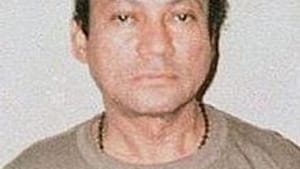Stay in the Loop
BSR publishes on a weekly schedule, with an email newsletter every Wednesday and Thursday morning. There’s no paywall, and subscribing is always free.
Two lists for your refrigerator
Global Goodfellas

After President Trump met with China’s President Xi Jinping earlier this month, esteemed Harvard professor Roderick MacFarquhar urged the two to join forces and get rid of North Korea’s dictator, Kim Jong-un. “It would be easy enough to list the benefits to China and the United States of ending the Kim dynasty,” MacFarquhar argued in the April 7, 2017, New York Times.
This is, of course, a brilliant idea. But it raises other, even more tantalizing possibilities. For starters: Why doesn’t Trump join forces with Kim Jong-un to get rid of Xi Jinping, who is potentially more dangerous than either Trump or Kim? Come to think of it, why don’t Xi and Kim join forces to get rid of Trump?
For that matter, why don’t Trump and Vladimir Putin join forces to remove Bashar al-Assad before he lays total waste to Syria? Now that you mention it, why don’t Putin and Assad join forces to unseat Abdel Fattah al-Sisi in Egypt and/or Recep Tayyip Erdoğan in Turkey?
Peruse the following list of global goodfellas, all currently preoccupied with solidifying their power. The combinations and permutations of potential alliances among them are exceeded only by the potential for alliances against each other.
1. Donald Trump (U.S.)
2. Vladimir Putin (Russia)
3. Xi Jinping (China)
4. Kim Jong-un (North Korea)
5. Bashar al-Assad (Syria)
6. Abdel Fattah Al-Sisi (Egypt)
7. Recep Tayyip Erdoğan (Turkey)
8. Rodrigo Duterte (Philippines)
These eight leaders share certain common characteristics. All believe the function of government is not to protect the rights of citizens but to promote the glory of the state and its leaders. All believe the world would be a better place if only they possessed more power than they already enjoy. All prefer to silence their enemies rather than make friends. All are mystified when crackdowns against their perceived enemies produce even more enemies.
In this space three months ago, I suggested that anyone curious to know how the Trump administration will turn out should watch Martin Scorsese’s 1990 mafia film Goodfellas— a classic illustration, I argued, of seemingly unchecked power planting the seeds of its own destruction. To judge from the current infighting inside the White House (vide the tensions between Steve Bannon and Jared Kushner, and Trump’s frustrated demand that they “work this out”), that process has already begun. But the lesson of Goodfellas— a true story — also applies globally, especially to the eight seemingly entrenched autocrats listed above.
Now peruse another list I recently discovered. I compiled it in 1993 by way of arguing that U.S. public policy had degenerated into a continuing quest for a “Villain of the Year”— preferably someone who’s foreign (usually), dangerous, and possessed of a face sufficiently recognizable to mount on dartboards and T-shirts. Here you go:
Villain of the Year
1973— H.R. Haldeman and John Ehrlichman (U.S.)
1974— Richard Nixon (U.S.)
1975— Fidel Castro (Cuba)
1976— Pol Pot (Cambodia)
1977— Idi Amin (Uganda)
1978— Leonid Brezhnev (Soviet Union)
1979— Ayatollah Ruhollah Khomeini (Iran)
1980— Ayatollah Ruhollah Khomeini (Iran)
1981— Hafez al-Assad (Syria)
1982— Wojciech Jaruzelski (Poland)
1983— Daniel Ortega (Nicaragua)
1984— P.W. Botha (South Africa)
1985— Ferdinand Marcos (Philippines)
1986— Muammar Khadaffi (Libya)
1987— Nicolae Ceaușescu (Romania)
1988— Michael Milken (U.S.)
1989— Manuel Noriega (Panama)
1990— Saddam Hussein (Iraq)
1991— Saddam Hussein (Iraq)
1992— Saddam Hussein (Iraq)
1993— Slobodan Milošević (Yugoslavia)
And the scorecard, please:
Of the 19 once-seemingly omnipotent heavies on this list, 15 were forced out of office against their will. Of those 15, three (Ceaușescu, Khadaffi, and Saddam Hussein) were executed; five were jailed (Haldeman, Ehrlichman, Milken, Noriega, and Milošević); and two fled into exile (Marcos and Idi Amin). Two others (Nixon and Botha) escaped legal sanction via a pardon and a suspended sentence. Only Castro, Hafez al-Assad, Khomeini, and Brezhnev died in bed and in power — and Brezhnev’s entire country expired just nine years after he did.
Only one man on this list exercises power today: Daniel Ortega, who was voted out of office in Nicaragua’s first free election in 1990 but won back the presidency in 2006.
Here’s my simple three-part antidote for anyone dismayed by the present state of the world: (1) Post these two lists on your refrigerator; (2) Check them daily; (3) Remind yourself: This too shall pass.
Sign up for our newsletter
All of the week's new articles, all in one place. Sign up for the free weekly BSR newsletters, and don't miss a conversation.

 Dan Rottenberg
Dan Rottenberg